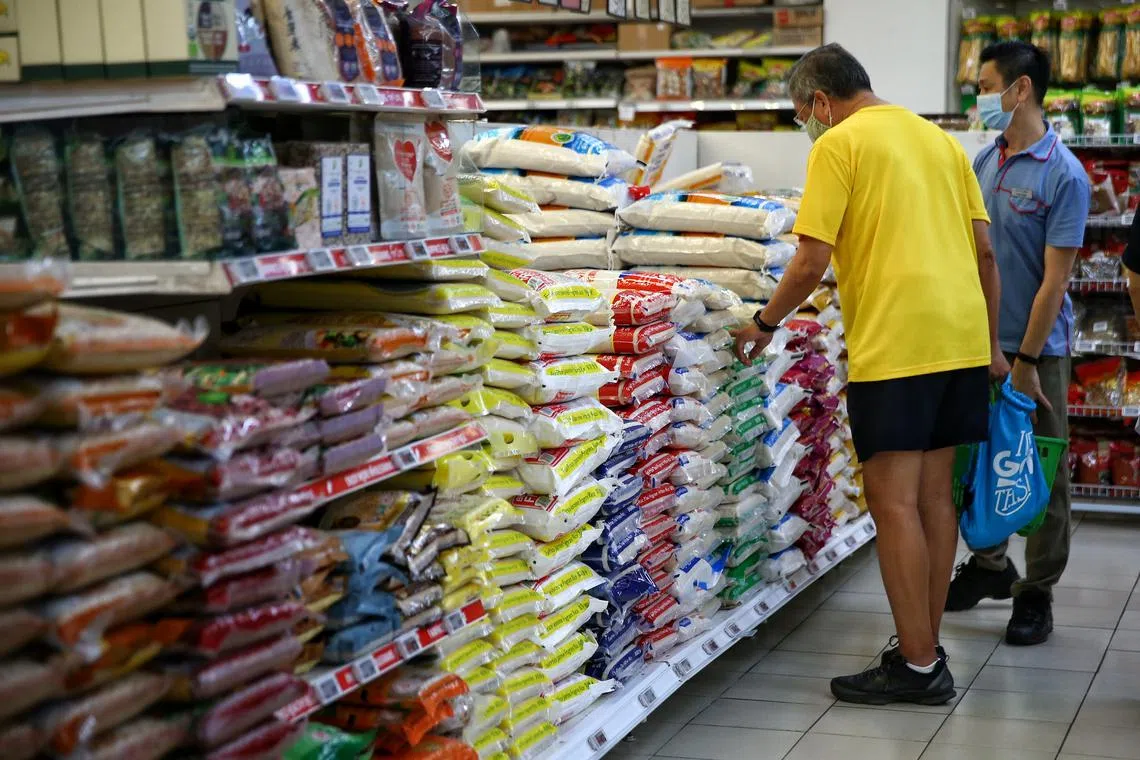Singapore, importers working to boost imports after Indian export ban on non-basmati rice: SFA
Sign up now: Get ST's newsletters delivered to your inbox

Singapore is currently seeking an exemption from India's ban on the export of non-basmati white rice.
PHOTO: ST FILE
Follow topic:
SINGAPORE – Rice importers and the Singapore authorities are working together closely to boost imports of different types of rice from a range of countries after India’s ban on the export of non-basmati white rice
The Singapore Food Agency (SFA), in response to queries on Friday, said that Singapore has contacted the Indian authorities to seek an exemption from the ban.
An SFA spokesman said the overall supply of rice in Singapore is stable and there is enough rice for everyone if everyone buys just what they need. He said: “Singapore has a multi-pronged strategy of import diversification and stockpiling to manage supply chain disruptions to rice imports. We diversify and import rice from over 30 countries.”
In 2022, India accounted for about 40 per cent of Singapore’s rice imports. The import of non-basmati rice from India – the only type affected by the ban – makes up about 17 per cent of the rice imported into Singapore, he added.
India, the world’s biggest rice exporter, banned the shipment of non-basmati white rice last Thursday in a bid to keep rice prices in the country at affordable levels, ahead of a general election due in early 2024.
The Indian government said shipments will be allowed if permission is given to countries that need to meet food security needs, based on requests from their governments.
India is grappling with high prices of grains, fruits and vegetables, and retail rice prices in its capital, Delhi, have climbed about 15 per cent in 2023, while the average nationwide price has gained more than 8 per cent, official data showed.
The SFA spokesman said rice importers in Singapore are required to hold a buffer inventory equivalent to twice their monthly imports under the Rice Stockpile Scheme, which helps to ensure adequate supply of rice in the market.
He said: “We review the inventory buffers regularly and stand ready to work closely with the industry if any adjustments are needed.
“Through these forward-looking strategies/policies, our overall supply of rice is currently stable and there is enough rice for everyone if everyone buys just what we need.”
Consumers in Singapore, he added, can expect supply disruption from time to time. The Government will do what it can to minimise the impact but it will not be able to completely mitigate disruptions to food supply.
He said: “Consumers are also encouraged to be flexible and adaptable by switching to other varieties of rice, or other sources of carbohydrates in the event of disruption.”
The DFI Retail Group, which has about 10,200 outlets in Hong Kong, Malaysia and Singapore, in an e-mail reply, said the demand for rice from India has remained stable, except for a small increase last week after news of India’s ban on non-basmati white rice exports was announced.
A spokesman for the retail giant, which runs Giant, Cold Storage, CS Fresh, Guardian and 7-Eleven branches in Singapore, said: “DFI has not increased the price of any Indian rice items.
“We are currently monitoring the situation and working closely with our diversified base of suppliers to ensure that our customers are able to purchase Indian rice products at affordable prices.”
A FairPrice Group spokesman said that over the past weekend, there was a slight increase in the sales volume of rice imported from India. He said: “However, the FairPrice Group is working with our suppliers to ensure the continuity of rice supplies through the employment of various strategies, including stockpiling, forward buying and diversifying of our import sources.
“The FairPrice Group will continue to ensure that our customers have a stable supply of rice at affordable prices. We would like to encourage customers to only buy what they need.”
A spokesman for local retailer Mustafa’s, which operates Mustafa Centre in Syed Alwi Road, said there was some panic-buying of Indian rice in its stores, but the situation now is “back to normal”.
He added that the price of Indian rice had gone up before the ban as the cost price had increased, but the retailer had already placed orders for Indian rice before the ban.


